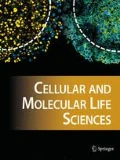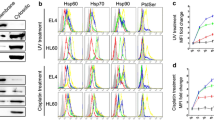Abstract.
CpG motifs originating from bacterial DNA (CpG DNA) can act as danger signals for the mammalian immune system. These CpG DNA motifs like many other pathogen-associated molecular patterns are believed to be recognized by a member of the toll-like receptor family, TLR-9. Here we show results suggesting that heat shock protein 90 (hsp90) is also implicated in the recognition of CpG DNA. Hsp90 was characterized as a binder to oligodeoxynucleotides (ODNs) containing CpG motifs (CpG ODNs) after several purification steps from crude protein extracts of peripheral blood mononuclear cells. This finding was further supported by direct binding of CpG ODNs to commercially available human hsp90. Additionally, immunohistochemistry studies showed redistribution of hsp90 upon CpG ODN uptake. Thus, we propose that hsp90 can act as a ligand transfer molecule and/or play a central role in the signaling cascade induced by CpG DNA.
Similar content being viewed by others
Author information
Authors and Affiliations
Additional information
Received 18 December 2002; accepted 6 January 2002
RID="*"
ID="*"Corresponding author. B. Agerberth and G. H. Gudmundsson contributed equally to this work.
Rights and permissions
About this article
Cite this article
Bandholtz, L., Guo, Y., Palmberg, C. et al. Hsp90 binds CpG oligonucleotides directly: implications for Hsp90 as a missing link in CpG signaling and recognition. CMLS, Cell. Mol. Life Sci. 60, 422–429 (2003). https://doi.org/10.1007/s000180300035
Issue Date:
DOI: https://doi.org/10.1007/s000180300035




